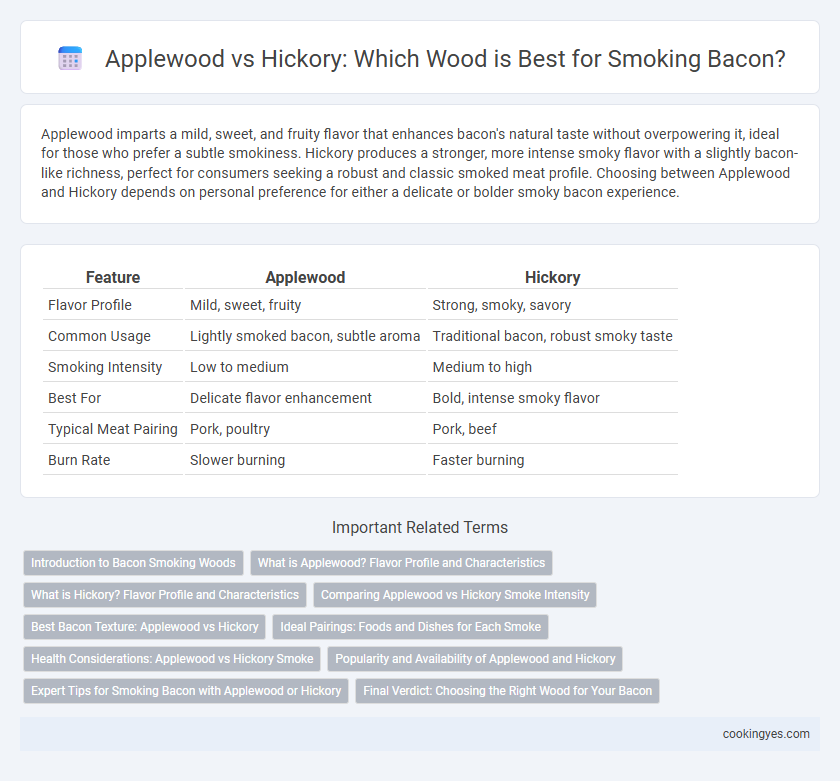Applewood imparts a mild, sweet, and fruity flavor that enhances bacon's natural taste without overpowering it, ideal for those who prefer a subtle smokiness. Hickory produces a stronger, more intense smoky flavor with a slightly bacon-like richness, perfect for consumers seeking a robust and classic smoked meat profile. Choosing between Applewood and Hickory depends on personal preference for either a delicate or bolder smoky bacon experience.
Table of Comparison
| Feature | Applewood | Hickory |
|---|---|---|
| Flavor Profile | Mild, sweet, fruity | Strong, smoky, savory |
| Common Usage | Lightly smoked bacon, subtle aroma | Traditional bacon, robust smoky taste |
| Smoking Intensity | Low to medium | Medium to high |
| Best For | Delicate flavor enhancement | Bold, intense smoky flavor |
| Typical Meat Pairing | Pork, poultry | Pork, beef |
| Burn Rate | Slower burning | Faster burning |
Introduction to Bacon Smoking Woods
Applewood and hickory are popular woods for smoking bacon, each imparting distinct flavors to the meat. Applewood offers a mild, sweet, and fruity aroma that enhances the bacon's natural savoriness without overpowering it. Hickory provides a stronger, smoky, and slightly bacon-like flavor, delivering a classic, robust taste preferred by many traditionalists.
What is Applewood? Flavor Profile and Characteristics
Applewood, derived from apple trees, imparts a mild, sweet, and fruity smoke flavor to bacon, enhancing its natural richness without overpowering. Its lower resin content produces a smoother, less intense smokiness compared to hickory, making it ideal for delicate meats like pork. Applewood smoke also adds a subtle hint of sweetness and a light, slightly tangy aroma, creating a balanced and nuanced taste profile in smoked bacon.
What is Hickory? Flavor Profile and Characteristics
Hickory is a dense hardwood prized for its strong, smoky flavor that imparts a bold, slightly sweet, and bacon-enhancing taste during the smoking process. Its natural sugars caramelize when heated, producing a rich, robust aroma and a deep amber color on the bacon's surface. Often favored for traditional Southern-style smoked bacon, hickory provides a powerful smoke intensity that stands out compared to milder woods like applewood.
Comparing Applewood vs Hickory Smoke Intensity
Applewood imparts a mild, sweet, and fruity smoke flavor to bacon, making it ideal for those who prefer a subtle smoky taste. Hickory produces a stronger, more robust, and slightly bitter smoke intensity, delivering a classic and intense smoky profile. The choice between applewood and hickory influences the bacon's overall flavor, with applewood favoring delicacy and hickory emphasizing boldness.
Best Bacon Texture: Applewood vs Hickory
Applewood smoking imparts a mild, sweet flavor to bacon, producing a tender texture with a subtle crispness ideal for delicate dishes. Hickory smoking delivers a stronger, smoky profile that enhances bacon with a firmer, chewier texture favored in hearty recipes. Choosing between applewood and hickory depends on whether you prefer a softer bite or a robust, textured chew in your smoked bacon.
Ideal Pairings: Foods and Dishes for Each Smoke
Applewood smoked bacon offers a sweet, mild flavor that pairs exceptionally well with breakfast dishes like pancakes, French toast, and fresh fruit, enhancing their natural sweetness. Hickory smoked bacon delivers a robust, smoky intensity that complements hearty meals such as barbecue ribs, baked beans, and savory sandwiches, providing a deep, smoky contrast. Both woods create distinct flavor profiles that elevate specific dishes, allowing cooks to tailor their bacon smoke to the meal's overall taste.
Health Considerations: Applewood vs Hickory Smoke
Applewood smoke produces a milder, sweeter flavor with fewer polycyclic aromatic hydrocarbons (PAHs), potentially reducing harmful compounds during bacon smoking compared to hickory. Hickory smoke offers a stronger, more intense smoky flavor but may generate higher levels of PAHs and volatile organic compounds (VOCs), which can pose greater health risks if consumed excessively. Choosing applewood for bacon smoking may provide a healthier balance between flavor and reduced exposure to carcinogenic smoke elements.
Popularity and Availability of Applewood and Hickory
Applewood and hickory are both popular wood choices for smoking bacon, with hickory often favored for its strong, smoky flavor and wide availability across the United States. Applewood offers a milder, slightly sweet smoke profile and is commonly found in specialty food stores and regions with abundant apple orchards. The popularity of hickory is boosted by its widespread use in barbecue culture, making it more readily accessible for most consumers compared to the more niche availability of applewood.
Expert Tips for Smoking Bacon with Applewood or Hickory
Expert tips for smoking bacon highlight Applewood's mild, sweet flavor that complements pork without overpowering, making it ideal for delicate smoked bacon profiles. Hickory provides a stronger, robust smoky taste, enhancing bacon with a bold, savory character preferred in Southern-style smoking. For balanced results, regulate smoke duration carefully: shorter times with Hickory prevent bitterness, while longer Applewood sessions deepen flavor without harshness.
Final Verdict: Choosing the Right Wood for Your Bacon
Applewood imparts a mild, sweet, and fruity smoke flavor to bacon, making it ideal for those seeking a subtle yet flavorful profile. Hickory produces a stronger, more robust smoky taste with a slightly bacon-like aroma that enhances the traditional bacon experience. Choosing between applewood and hickory depends on whether you prefer a delicate sweetness or a bold, intense smoke flavor in your bacon.
Applewood vs Hickory for Bacon Smoking Infographic

 cookingyes.com
cookingyes.com